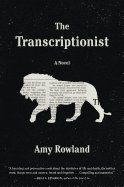
Lena Respass is the last transcriptionist at the Record, New York City's largest and oldest newspaper. Each day, she hooks herself to a Dictaphone in an otherwise empty 11th-floor room overlooking Times Square and transcribes the voices of reporters calling in stories. Her only conversations are with a pigeon on her window ledge and an occasional harried editor with instructions to "just slug it, type it, dump it. We need it." Few at the paper even know her "office" exists, fewer still know her name. When her shifts end, she calls the news desk to report only that "this is the Recording Room calling in for a goodnight."
With Lena, Amy Rowland--an editor (and former transcriptionist) at the New York Times Book Review--updates a long line of isolated underground literary protagonists that includes Ralph Ellison's invisible man and Colson Whitehead's intuitionist. She even flavors this first novel with a taste of Kafka, as in her description of the Record newsroom with its "well-medicated activity, soundless keypads, and clusters of low-partitioned cubicles... like a benign government agency in a bad budget cycle."
Rowland's The Transcriptionist is a behind-the-firewall look at a traditional newspaper's death spiral. More memorably, however, it is the story of a sensitive, observant woman who finally decides to disconnect from the disembodied voices reporting war, suicide and suffering--"listening to people's tragedies all day"--and reconnect with the people on the streets who actually experience them. It's not such a reach to bookend Amy Rowland's debut contemporary existential novel with the original: Dostoyevsky's Notes from Underground. It's that good. --Bruce Jacobs, founding partner, Watermark Books & Cafe, Wichita, Kan.

